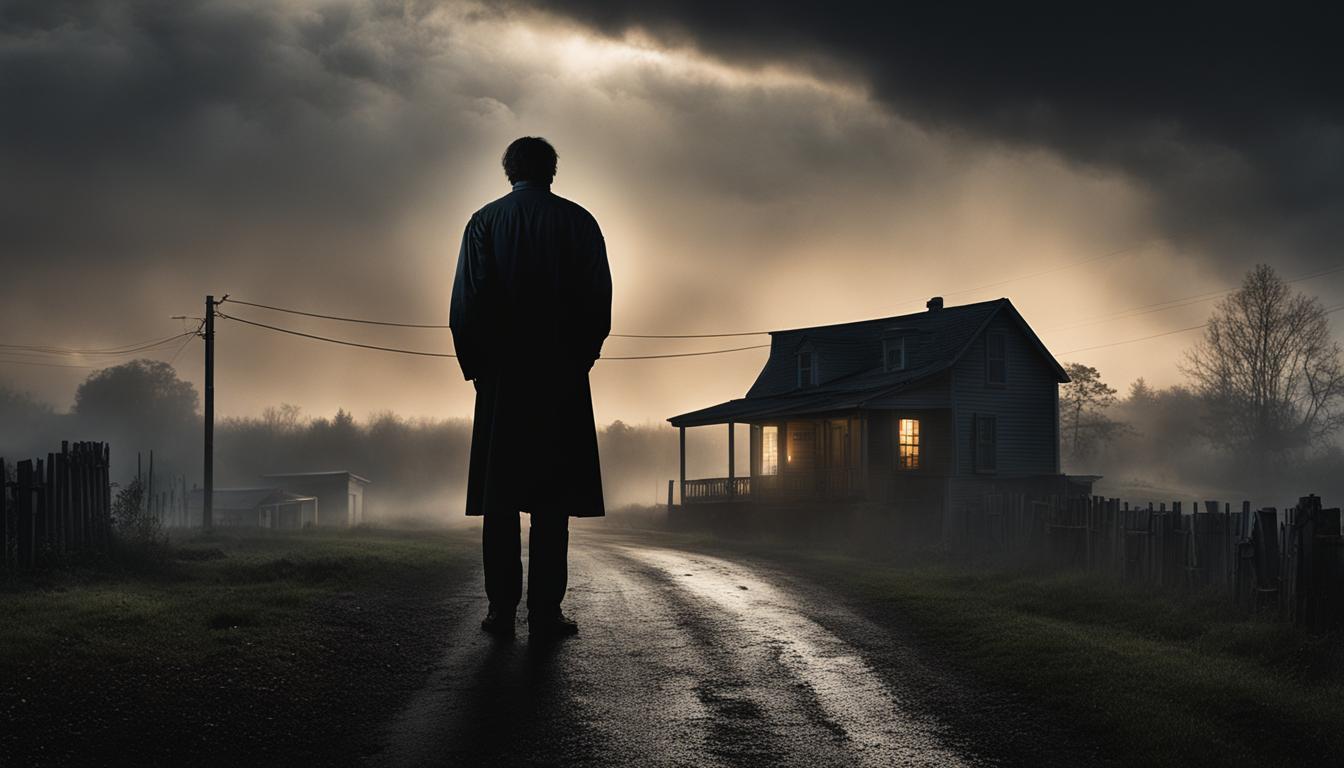Stephen King is a household name in the literary world, known for his gripping horror novels and captivating storytelling. One of the most significant periods in King’s career is undoubtedly his Golden Years era, a time where his writing skyrocketed in popularity and critical acclaim.
During this period, King produced some of his most iconic and memorable works, including “The Shining,” “Carrie,” and “It.” These novels not only solidified King’s status as a master of horror but also left a lasting impact on popular culture and the literary world.
In this article, we’ll delve into King’s Golden Years era, exploring its significance, impact, and legacy on popular culture and the horror genre. Join us as we take a closer look at one of literature’s most impressive and influential periods.
Early Life and Career of Stephen King
Stephen King, one of the most successful and well-known authors of the modern era, was born in Portland, Maine in 1947. King’s early childhood was marked by a series of tragedies that would later shape his writing. When King was only two years old, his father abandoned the family. A few years later, King’s mother relocated the family to Durham, Maine where King spent most of his childhood.
At a young age, King showed an early interest in writing and storytelling. He began submitting short stories to magazines at the age of 12, and by the time he was in high school, he was regularly publishing articles in his school’s newspaper. After graduating from the University of Maine, King worked in a number of odd jobs to support his family while continuing to write in his spare time.
King’s early writing career was not without its struggles. Despite his love for writing and storytelling, it took him several years to achieve significant success. King’s first novel, Carrie, was initially rejected by publishers, prompting King to toss it in the trash. His wife, however, retrieved the manuscript and encouraged him to keep trying. Finally, in 1973, Carrie was published, launching King’s career as a professional writer.
King’s early years were marked by both determination and obstacles, shaping him into the prolific and celebrated writer he is today.
The Breakthrough Novel: Carrie
Stephen King’s rise to fame is closely tied to the publication of his debut novel, Carrie. Released in 1974, this breakthrough novel immediately captured public attention with its unique blend of horror and thriller elements, and its empathetic portrayal of a troubled young girl with telekinetic abilities.
The success of Carrie was key to the establishment of King’s Golden Years era, which saw him produce one bestseller after another, cementing his position as one of the most popular and influential authors of his time. Carrie has since become an iconic work of horror fiction, inspiring numerous adaptations across different media.
| Publication Date | Adaptations | Awards |
|---|---|---|
| April 5, 1974 | Film, TV movie, Broadway musical, comic book adaptations | Nominee for the National Book Award, recipient of the William Randolph Hearst Award |
The enduring appeal of Carrie can be attributed to its exploration of themes such as teenage angst, bullying, and social isolation, which continue to resonate with contemporary audiences. It is a testament to Stephen King’s ability to craft stories that leave a lasting impact on readers, cementing his legacy as a master of horror and an icon of American literature.
The Shining: A Masterpiece of Horror
Considered one of Stephen King’s greatest achievements, “The Shining” is a masterful work of horror that has inspired countless adaptations and imitators. The novel tells the story of Jack Torrance, a struggling writer who takes a job as the winter caretaker of the isolated Overlook Hotel, with his family in tow. As the months pass, the hotel’s dark history begins to exert a malevolent influence on Jack, driving him to the brink of madness.
The success of “The Shining” lies in King’s ability to create an atmosphere of sustained terror and suspense, as well as his skillful characterization and exploration of complex themes such as addiction and family dysfunction. The novel has been praised for its precise prose and vivid imagery, which bring the Overlook Hotel and its otherworldly inhabitants to life on the page.
Since its publication in 1977, “The Shining” has been adapted for the screen several times, most notably by Stanley Kubrick in his 1980 film starring Jack Nicholson and Shelley Duvall. Despite some differences from the novel, Kubrick’s film has become a classic in its own right, thanks in part to its haunting visuals and Nicholson’s iconic performance as Jack Torrance.

Overall, “The Shining” stands as a testament to King’s mastery of the horror genre, and its enduring popularity is a testament to its power to terrify and captivate readers and viewers alike.
The Dark Tower Series: A Magnum Opus
Stephen King’s “The Dark Tower” series is considered by many to be his magnum opus. The eight-book series spans across multiple genres, including horror, fantasy, and science fiction.
The series follows the journey of Roland Deschain, a gunslinger on a quest to reach the Dark Tower, which is said to be the center of all universes. Along the way, Roland encounters a cast of diverse and fascinating characters, weaving together a complex and intricate story.
The Dark Tower series has garnered a massive following since its release, with fans drawn to King’s vivid storytelling and imaginative world-building. The series has even inspired a Marvel comic book adaptation and a film adaptation starring Idris Elba.
King himself views the series as a crucial element in his career, stating in interviews that it was the work he most enjoyed creating. With its epic scope and enduring popularity, “The Dark Tower” cements King’s position as one of the most influential and celebrated authors of our time.
It: A Terrifying Tale
Stephen King’s “It” is a horror novel that takes readers on a terrifying journey through the small town of Derry, where a malevolent entity preys on the town’s children every 27 years. Through its usage of fear and symbolism, It has become one of King’s most iconic works and a staple of the horror genre.
The novel’s primary antagonist, Pennywise the Clown, has become one of King’s most memorable creations, haunting readers with his sinister grin and malevolent deeds. Through his character, King explores the concept of fear and its effects on the human psyche, delving into the deep-seated traumas that can plague a person’s life.
“It” has had a significant cultural impact since its release in 1986, inspiring film and television adaptations that have introduced King’s work to new generations and cementing its place in horror’s pantheon. Its influence can be seen in works across all media, demonstrating the long-lasting impact of King’s storytelling prowess.
The Symbolism of Fear
At its heart, “It” is a story about fear and how it can shape a person’s life. King uses the novel to explore the ways in which fear can hold us back and keep us from living our lives to the fullest.
Through the character of Bill Denbrough, who loses his brother to Pennywise’s terror, “It” examines the ways in which loss and trauma can impact a person’s mind and spirit. The novel offers a scary but ultimately cathartic exploration of the ways in which we can overcome our fears and take control of our own lives.
The Cultural Impact of “It”
Since its publication, “It” has become a pop culture phenomenon, inspiring a number of adaptations that have introduced the story to new audiences. The novel was first adapted into a television miniseries in 1990, which brought the story to a wider audience and cemented its status as a classic of the horror genre.
In 2017, “It” was adapted into a highly successful feature film, which updated the story for a new generation and introduced Pennywise to a whole new audience. The film’s success has led to a sequel, further solidifying the cultural impact of the novel and its characters.
Misery: A Thrilling Psychological Thriller
Stephen King’s “Misery” is a riveting psychological thriller that explores the disturbing nature of obsession. The novel follows Paul Sheldon, a successful author who finds himself the prisoner of his number one fan, Annie Wilkes, after a car accident leaves him injured and stranded in the middle of nowhere. As Paul struggles to escape Annie’s clutches, their relationship becomes increasingly twisted and dangerous.
King’s masterful use of psychological horror is on full display in “Misery,” as Annie’s growing obsession with Paul creates an atmosphere of intense fear and paranoia. The novel is a chilling exploration of the human psyche and the lengths to which people will go to satisfy their obsessions.

Adapted into a successful film starring Kathy Bates as Annie Wilkes, “Misery” solidified King’s reputation as a master of the psychological thriller genre. The novel’s influence can still be felt today in the works of modern authors and filmmakers.
Stand by Me: From Page to Screen
Stephen King’s novella, “The Body,” was adapted into the iconic coming-of-age film, Stand by Me. The film, directed by Rob Reiner, depicts four young boys on a journey to find the body of a missing boy in a small town in Oregon. The story highlights the boys’ friendship and the challenges and adventures they face along the way.
The film was a critical and commercial success and has become a beloved classic since its release in 1986. It showcased the successful transition from page to screen, capturing the heart and soul of King’s original story and bringing it to life for a wider audience.
The film’s success can be attributed to the talented cast, which included young actors like Wil Wheaton, River Phoenix, and Corey Feldman, who brought the characters to life with charm and authenticity. Additionally, the screenplay, written by Raynold Gideon and Bruce A. Evans, effectively conveyed the emotional depth and complexity of King’s novella.
| Novella | Film |
|---|---|
| Published in 1982 | Released in 1986 |
| Set in Maine | Set in Oregon |
| Main character’s name is Gordie Lachance | Main character’s name is Gordie Lachance |
| The story is told from Gordie’s perspective as an adult looking back on his childhood | The story is presented in chronological order, with flashbacks and voiceovers |
Overall, Stand by Me showcases the talent of Stephen King as a writer and demonstrates the power of storytelling through multiple mediums. The film has since become a cultural touchstone, inspiring generations of filmmakers and writers to create their own coming-of-age stories.
The Impact of Stephen King’s Golden Years
Stephen King’s Golden Years produced a body of work that had a significant impact on the literary world, popular culture, and the horror genre. His prolific output and iconic novels solidified his position as a master of horror and cemented his legacy in the literary canon.
King’s Golden Years era also influenced a generation of writers, who often cite his work as a major source of inspiration. His impact can be seen in the numerous adaptations of his works, including films, TV shows, and even comic books. The continued popularity of his novels speaks volumes about the enduring impact of his Golden Years output.
The Horror Genre
King’s Golden Years output redefined the horror genre and set the standard for modern horror fiction. He pushed the boundaries of what was considered acceptable in popular literature, bringing horror into the mainstream and paving the way for future horror writers.
| Impact | Details |
|---|---|
| Taboo-breaking | Golden Years works explored controversial and taboo subjects, such as child abuse, addiction, and mental illness. |
| Critical Acclaim | King’s works were highly respected by literary critics, earning him numerous accolades and awards. |
| Popularity | Golden Years works were incredibly popular, with many becoming bestsellers and spawning multiple adaptations. |
King’s impact on the horror genre can still be felt today, as many contemporary horror writers cite him as a major influence.
Literary World and Popular Culture
King’s Golden Years output also had a significant impact on the literary world and popular culture. His novels were widely read and debated, becoming cultural touchstones in their own right.
| Impact | Details |
|---|---|
| Iconic Status | The Golden Years produced some of King’s most iconic works, such as “The Shining”, “It”, and “The Stand”. |
| Cultural Relevance | King’s works are often cited in popular culture, from music to film and television, demonstrating their continued relevance and impact. |
| Legacy | King’s Golden Years output cemented his place in the literary world and ensured his work would be remembered for generations to come. |
King’s influence on popular culture and the literary world is undeniable, and his Golden Years output played a significant role in shaping the cultural landscape of the late 20th century.
Stephen King’s Influence on Future Writers
Stephen King’s impact on the literary world extends far beyond his own works. His unique style, themes, and storytelling techniques have influenced countless future writers, cementing his place in literary history as a true master of the craft.
One of King’s greatest contributions to the world of writing is his ability to create relatable, three-dimensional characters that readers can connect with on a deep emotional level. This skill has been emulated by many future writers who strive to create similarly compelling characters.
Another area where King’s influence can be seen is in the horror genre, where his works have inspired countless writers to explore the darker side of human nature. His use of suspense, atmosphere, and psychological terror has become a hallmark of modern horror fiction, shaping the genre for generations to come.
King has also been a major influence on emerging writers in terms of the importance of persistence and hard work in the craft of writing. His numerous rejections and setbacks early in his career serve as a testament to the idea that success in writing requires dedication and perseverance.
Overall, Stephen King’s influence on the world of writing is immeasurable. His impact on the horror genre and his ability to create memorable characters and immersive worlds have inspired countless future writers to pursue their own paths in the literary world, ensuring that his legacy will continue to live on for years to come.
The Legacy of Stephen King’s Golden Years
Stephen King’s Golden Years era was a prolific time in his career, producing some of his most influential and beloved works. But beyond the works themselves, the legacy of this era has continued to shape the literary world and inspire future generations of writers.
In the decades since the Golden Years, King’s impact on horror and popular culture has been immeasurable. His unique voice and storytelling techniques continue to influence writers across genres, cementing his place as one of the most important voices in contemporary literature.
King’s ability to tap into universal fears and anxieties has resonated with readers around the world, and his works continue to be adapted into films, TV shows, and other media. His legacy is a testament to the enduring power of storytelling, and the importance of pushing boundaries and taking risks.
From “Carrie” to “The Dark Tower,” the works of Stephen King’s Golden Years era have become modern classics, cherished by fans and critics alike. As we look to the future of horror and literature, King’s influence will undoubtedly continue to be felt for decades to come.
Conclusion
In conclusion, Stephen King’s Golden Years era had an immense impact on both his career and the literary world as a whole. King’s unique writing style, imaginative storytelling, and ability to tap into societal fears and anxieties marked a turning point in the horror genre and cemented his place as one of the most influential writers of our time.
From the breakthrough success of “Carrie” to the epic storytelling of “The Dark Tower” series, King’s Golden Years produced some of his most iconic works that continue to captivate readers and inspire future generations of writers.
King’s influence on popular culture and the horror genre is undeniable, and his legacy will continue to be felt for years to come. As we reflect on his Golden Years era, we can appreciate the lasting impact of his contributions to literature and the enduring power of his stories.



